Alcohol and Drug Use in Ageing Populations
NCETA is assisting specialist and generalist health and welfare workers to better prevent, assess and respond to the needs of older people experiencing, or at risk of experiencing, alcohol and other drug (AOD) related harm. Longer life expectancy, changing patterns of AOD use and differing expectations of current and future generations of older people will all impact on future AOD service delivery. To-date comparatively little attention has been directed to the needs of older people and AOD use and, as a result, AOD use patterns and problems among older Australians have been under-researched and are not well understood. However, this is quickly becoming an emerging area of interest requiring greater resources, improved understanding, changes in service provision.
When addressing AOD issues among older people, attention will also need to be directed to the different needs of the various age groups. Those aged 55-65, 65-80 and 80+ may have different life experiences related to the year they were born, the cohort they grew up with and world events during their formative and later years. Similarly, those from different cultural backgrounds may have specific needs as will Aboriginal and Torres Strait Islander People. Hence, the term ‘older people’ should not be interpreted to mean a large single undifferentiated group. Sensitive responses are required to address the needs of the very diverse population groups that fall under the broad umbrella heading of ‘older people’.
The under-recognition of this important area will constitute significant challenges for services into the future.
NCETA Resources
Grey Matters: Preventing and responding to alcohol and other drug problems among older Australians Information Sheets
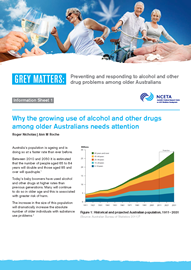 |
Information Sheet 1: References
|
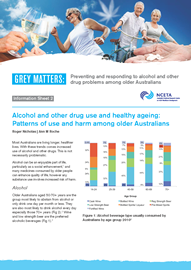 |
Information Sheet 2: References
|
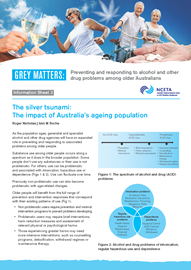 |
Information Sheet 3: References
|
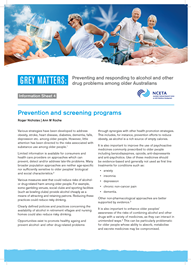 |
Information Sheet 4: References
|
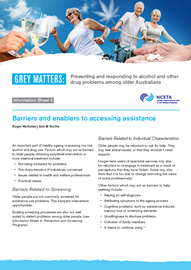 |
Information Sheet 5: References
|
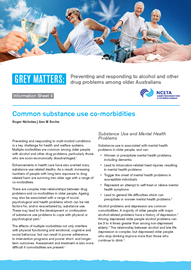 |
Information Sheet 6: References
|
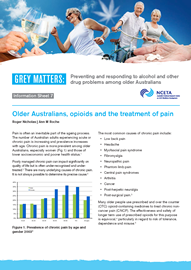 |
Information Sheet 7: References
|
Grey Matters: Preventing and responding to alcohol and other drug problems among older Australians Reference List |
|
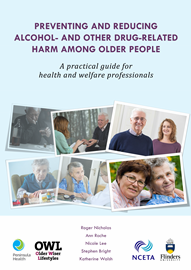 |
|
Other Research & Resources
Research
Australian Institute of Health and welfare. (2020). Alcohol, Tobacco & other Drugs in Australia: Older people. Available here.
Chapman, J., Harrison, N., Kostadinov, V., Skinner, N., Roche, A. (2020). Older Australians' perceptions of alcohol‐related harms and low‐risk alcohol guidelines. Drug and Alcohol Review 39, 44–54.
Gossop, M. (2008). Substance use among older adults: A neglected problem. Lisbon, Portugal: European Monitoring Centre for Drugs and Drug Addiction.
Hunter, B. (2011). Older people and alcohol and other drugs. Melbourne: Australian Drug Foundation.
Hunter, B., & Lubman, D. (2010). Substance misuse: Management in the older population. Australian Family Physician, 39(10), 738-741.
Kelsall, J., Parkes, P., Watson, M., Madden, A., & Byrne, J. (2011). Double Jeopardy: Older injecting opioid users in Australia. Canberra: Australian Injecting and Illicit Drug Users League.
NSW Ministry of Health. (2015). Older People's Drug and Alcohol Project - Full Report. North Sydney: NSW Ministry of Health.
Rao, R., Crome, I., Crome, P., Iliffe,S. (2019) Substance misuse in later life: challenges for primary care: A review of policy and evidence. Primary Health Care Research Development. 20: e117.
Rao, R., & Roche, A. (2017). Substance misuse in older people. British Medical Journal. 358. j3885.
Roche, A., Harrison, N., Chapman, J., Kostadinov, V. Woodman, R. (20200). Ageing and Alcohol: Drinking Typologies among Older Adults. Journal of Aging and Health, 32 (10) 1486–1497.
Roche, A., & Kostadinov, V. (2016). Bongs and baby boomers: Trends in cannabis use among older Australians. Australasian Journal on Ageing. doi.org/10.1111/ajag.12357
Roche, A., & Kostadinov, V. (2019). Baby boomers and booze: we should be worried about how older Australians are drinking. The Medical Journal of Australia. 211(8), p.382.
Royal College of Psychiatrists. (2011). Our Invisible Addicts. London: Royal College of Psychiatrists.
Wilkinson, C., & Dare, J. (2014). Shades of grey: The need for a multi-disciplinary approach to research investigating alcohol and ageing. Journal of Public Health Research, 3, 180.
Wilkinson, C., Dare, J., Waters, S., Allsop, S., & McHale, S. (2012). An exploration of how social context and type of living arrangement are linked to alcohol consumption amongst older Australians. Canberra: Foundation for Alcohol Research and Education.
Wilkinson, C. (2018). Older Australians: Trends and Impacts of Alcohol and other Drug Use. Perth. National Drug Research Institute, Curtin University.
Resources
Alcohol and Drug Foundation. (ND). Alcohol, Other Drugs and Older People Toolkit. Available here.
Duggan, M. (2014). Wiser and older: Safer drinking throughout life. Tasmania: Drug Education Network.
Council on The Ageing. (ND). Alcohol and Older Australians. Available here.
European Monitoring Centre for Drugs and Drug Addiction (EMCDDA). (2010). Treatment and care for older drug users. Luxembourg: Publications Office of the European Union.
Haber, P., Lintzeris, N., Proude, E., & Lopatko, O. (2009). Guidelines for the Treatment of Alcohol Problems. Canberra: Australian Government Department of Health and Ageing.
Matua Raki. The art of engagement. Older people and AOD. Wellington: Matua Raki: The National Addiction Workforce Development Centre.
Matua Raki. Assessment and screening issues for older adults. Using the method from the Alcohol Related Problems Survey (ARPS). Wellington: Matua Raki: The National Addiction Workforce Development Centre.
Matua Raki. Working with Older People. Cognitive Impairment and Compulsory Treatment. Wellington: Matua Raki: The National Addiction Workforce Development Centre.
Matua Raki. Alcohol/drug interactions. Wellington: Matua Raki: The National Addiction Workforce Development Centre.
Wadd, S., Lapworth, K., Sullivan, M., Forrester, D., & Galvani, S. (2011). Working with older drinkers. Bedford: Tilda Goldberg Centre, University of Bedfordshire.
Newspaper Articles
Goodyear, P. (2016, April 25). Getting Older? Why less is more. Sydney Morning Herald. Retrieved from http://www.smh.com.au/lifestyle/diet-and-fitness/getting-older-why-less-is-more-when-it-comes-to-alcohol-20160425-goe2hf.html.